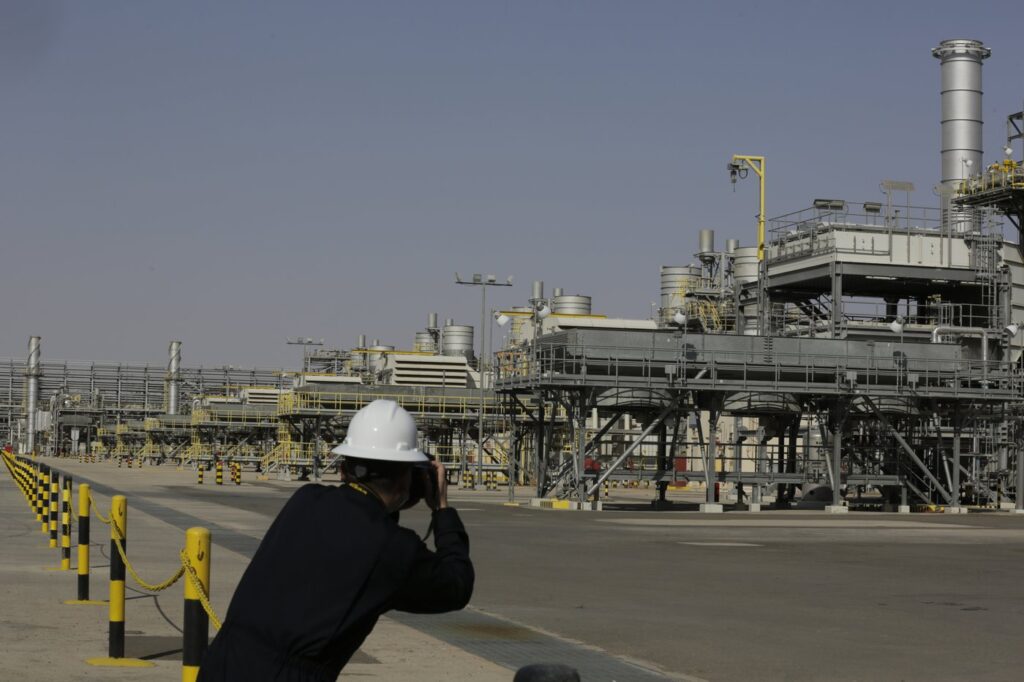Associate Press copy is provided via The Canadian Press

FILE – A photographer takes pictures of the Khurais oil field during a tour for journalists, 150 km east-northeast of Riyadh, Saudi Arabia, June 28, 2021. . (AP Photo/Amr Nabil, File)
DUBAI, United Arab Emirates (AP) — Saudi Arabia and Russia agreed Tuesday to extend their voluntary oil production cuts through the end of this year, trimming 1.3 million barrels of crude out of the global market and boosting energy prices.
The dual announcements from Riyadh and Moscow pushed benchmark Brent crude above $90 a barrel in trading Tuesday afternoon, a price unseen in the market since November.
The countries’ moves likely will increase the cost for motorists at gasoline pumps and put new pressure on Saudi Arabia’s relationship with the United States. President Joe Biden last year warned the kingdom there would be unspecified “consequences” for partnering with Russia on cuts as Moscow wages war on Ukraine.
Saudi Arabia’s announcement, carried by the state-run Saudi Press Agency, said the country still would monitor the market and could take further action if necessary.
“This additional voluntary cut comes to reinforce the precautionary efforts made by OPEC+ countries with the aim of supporting the stability and balance of oil markets,” the Saudi Press Agency report said, citing an unnamed Energy Ministry official.
State-run Russian news agency Tass quoted Alexander Novak, Russia’s deputy prime minister and former energy minister, as saying Moscow would continue its 300,000 barrel a day cut.
The decision “is aimed at strengthening the precautionary measures taken by OPEC+ countries in order to maintain stability and balance of oil markets,” Novak said.
Benchmark Brent crude traded Tuesday at $90 a barrel immediately after the announcement. Brent had largely hovered between $75 and $85 a barrel since last October.
There was no immediate reaction in Washington, though U.S. lawmakers have criticized OPEC, Saudi Arabia and Russia over their past production decisions.
The average gallon of regular unleaded gasoline in the U.S. stands at $3.81, according to AAA. That’s up just a few cents from this time last year, coming after the Labor Day weekend’s typically higher prices.
The Saudi reduction, which began in July, comes as the other OPEC+ producers have agreed to extend earlier production cuts through next year.
A series of production cuts over the past year has failed to substantially boost prices amid weakened demand from China and tighter monetary policy aimed at combating inflation. But with international travel back up to nearly pre-pandemic levels, the demand for oil likely will continue to rise.
The Saudis are particularly keen to boost oil prices in order to fund Vision 2030, an ambitious plan to overhaul the kingdom’s economy, reduce its dependence on oil and to create jobs for a young population.
The plan includes several massive infrastructure projects, including the construction of a futuristic $500 billion city called Neom.
But Saudi Arabia also has to manage its relationship with Washington. Biden campaigned on a promise of making the kingdom’s powerful Crown Prince Mohammed bin Salman a “pariah” over the 2018 killing of Washington Post columnist Jamal Khashoggi.
In recent months, tensions eased slightly as Biden’s administration sought a deal with Riyadh for it to diplomatically recognize Israel.
But those talks include Saudi Arabia pushing for a nuclear cooperation deal that includes America allowing it to enrich uranium in the kingdom — something that worries nonproliferation experts, as spinning centrifuges open the door to a possible weapons program.
Prince Mohammed already has said the kingdom would pursue an atomic bomb if Iran had one, potentially creating a nuclear arms race in the region as Tehran’s program continues to advance closer to weapons-grade levels. Saudi Arabia and Iran reached a détente in recent months, though the region remains tense amid the wider tensions between Iran and the U.S.
Higher oil prices would also help Russian President Vladimir Putin fund his war on Ukraine. Western countries have used a price cap to try to cut into Moscow’s revenues.
Western sanctions mean Moscow is forced to sell its oil at a discount to countries like China and India.
Jon Gambrell, The Associated Press
- 0100 Turnbull Project Manager0100 Turnbull Project Manager
- 0099 Mryglod Steel 1080p0099 Mryglod Steel 1080p
- 0097 Eagle Sky Ventures LTD0097 Eagle Sky Ventures LTD
- 0095 Fast Trucking nearly 70 years good at it0095 Fast Trucking nearly 70 years good at it
- 0053 Kingston Midstream Westspur Alameda Click Before You Dig0053 Kingston Midstream Westspur Alameda Click Before You Dig
- 0092 Turnbull projects big and small0092 Turnbull projects big and small
- 0046 City of Estevan This is Estevan Teaser0046 City of Estevan This is Estevan Teaser
- 0087 Lori Carr Coal Expansion0087 Lori Carr Coal Expansion
- 0077 Caprice Resources Stand Up For Free Speech0077 Caprice Resources Stand Up For Free Speech
- 0076 Latus only0076 Latus only
- 0061 SIMSA 2024 For Sask Buy Sask0061 SIMSA 2024 For Sask Buy Sask
- 0055 Smart Power Be Smart with your Power office0055 Smart Power Be Smart with your Power office
- 0051 JML Hiring Pumpjack assembly0051 JML Hiring Pumpjack assembly
- 0049 Scotsburn Dental soft guitar0049 Scotsburn Dental soft guitar
- 0041 DEEP Since 2018 now we are going to build0041 DEEP Since 2018 now we are going to build
- 0032 IWS Summer hiring rock trailer music
- 0022 Grimes winter hiring
- 0021 OSY Rentals S8 Promo
- 0018 IWS Hiring Royal Summer
- 0013 Panther Drilling PO ad 03 top drive rigs
- 0006 JK Junior
- 0002 gilliss casing services0002 gilliss casing services
- 9002 Pipeline Online 30 sec EBEX9002 Pipeline Online 30 sec EBEX
- 9001
